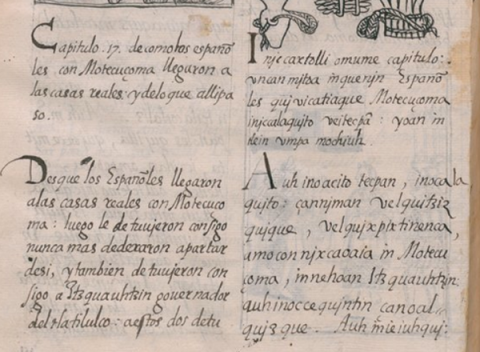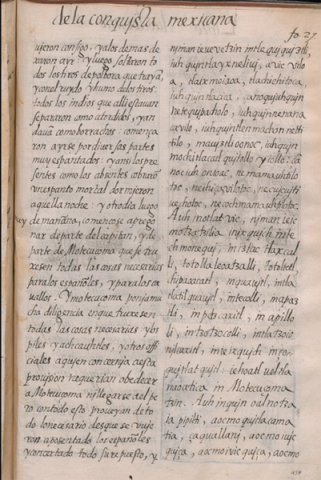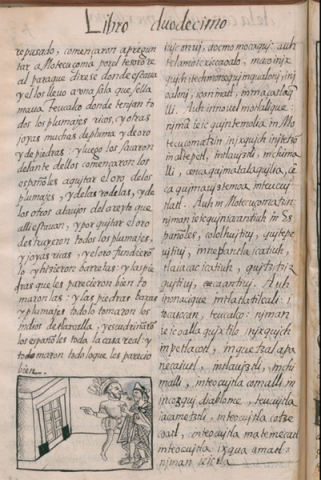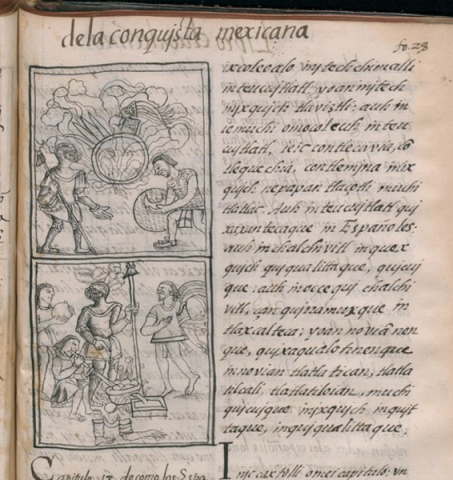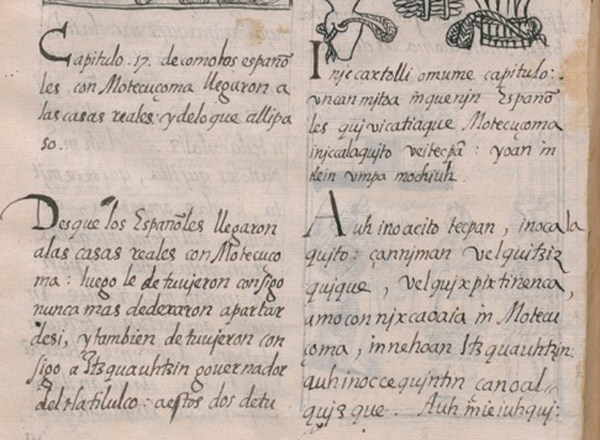 |
[Transcription of the Nahuatl (right-hand column) by James Lockhart:]
[f. 26v., cont.] Inic caxtolli omume capitulo: vncan mitoa in quenin Españoles quivicatiaque Motecuçoma inic calaquito vei tecpā: yoan in tlein vmpa mochiuh.
Auh in oacito tecpan, in ocalaquito: çan niman vel quitzizquique,* vel quixpixtinenca, amo connixcaoaia in Motecuçoma, innehoan Itzquauhtzin: auh in oc cequintin çan oalquizque.
Auh in ie iuhqui:
----------
*QUITZIZQUIQUE. Read “quitzitzquique.” The present case is possibly a simple slip, but final tz was sometimes lenited in this fashion, and the same substitution is found at fol. 27v.
|
[Translation of the Nahuatl (right-hand column) by James Lockhart:]
Seventeenth chapter, where it is said how the Spaniards went with Moteucçoma to enter the great palace, and what happened there.
And when they had reached the palace and gone in, immediately they seized Moteucçoma and kept close watch over him, not letting him out of their sight, and Itzquauhtzin along with him. But the others were just [allowed to] come back out.
And when this had happened,
[Translation of the Spanish (left-hand column) by James Lockhart:]
Chapter Seventeen, of how the Spaniards arrived at the royal palace with Moteucçoma and what happened there.
As soon as the Spaniards arrived at the royal palace with Moteucçoma, they detained him there with them and never again let him8 away from them. They also detained with them Itzquauhtzin, governor of Tlatelolco. They
|
[Translation of the Nahuatl into Spanish by Fr. Bernardino de Sahagún; transcription of the Spanish (left-hand column) by James Lockhart:]
[f. 26v., cont.] Capitulo .17. de como los españoles con Motecuçoma llegaron a las casas reales: y de lo que alli paso.
Desque los Españoles llegaron a las casas reales con MotecuçomaL kuego le detuuieron consigo nunca mas de* dexaron apartar de si, y tambien detuuieron consigo a Itzquauhtzin gouernador del tlatilulco: a estos dos detu
----------
*DE. For "le."
|
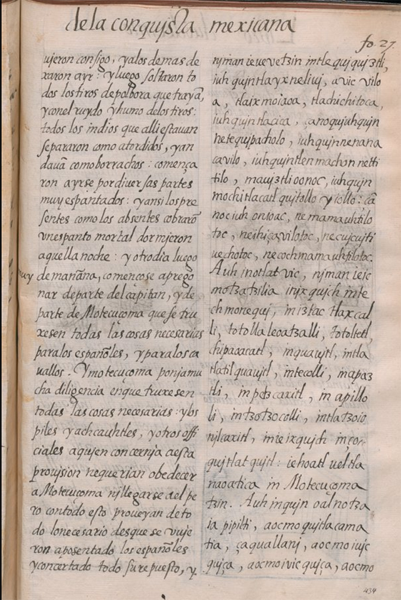 |
[Transcription of the Nahuatl (right-hand column) by James Lockhart:]
[f. 27r.] niman ie uevetzin* in tlequiquiztli, iuhquin tlayxneliui, avic viloa, tlaixmoiaoa, tlachichitoca, iuhquin tlacica, çan oquiuhquin netequipacholo, iuhquin nenanacavilo, iuhquin tlen machonnettitilo, mauiztli oonoc, iuhquin mochi tlacatl quitollo yiollo: çān oc iuh onioac, nemamauhtilotoc neihiçavilotoc, necuicuitiuechotoc, necochmamauhtilotoc.
Auh in otlatvic, niman ie ic motzatzilia in ixquichintech monequi, in iztac tlaxcalli, totollaleoatzalli,** totoltetl, chipaoac atl, in quauitl, in tlatlatilquauitl, intecolli, in apaztli, in petzcaxitl, in apilloli, in tzotzocolli, in tlatzoionilcaxitl, in ie ixquich in çoquitlatquitl: iehoatluel tlanaoatica in Motecuçomatzin. Auh in quinoalnotzaia pipilti, aocmo quitlacamatia, ça quallani, aocmoiuic quiça,*** aocomo
----------
*UEVETZIN. Read "uevetzi." The writer probably intended this word to be a contraction of "uevetzi" and "in" and then added "in" after all.
**TOTOLLALEOATZALLI. Read "totollatleoatzalli." This form is possibly more than a simple error; see the same word at fol. 43v.
***AOCMO IUIC QUIÇA. In the manuscript, the phrase is inadvertently repeated (as "aocmo ivic quiça,").
|
[Translation of the Nahuatl (right-hand column) by James Lockhart:]
then the various guns were fired. It seemed that everything became confused; people went this way and that, scattering and darting about. It was as though everyone’s tongue were out, everyone was preoccupied, everyone had been taking mushrooms, as though who knows what had been shown to everyone. Fear reigned, as though everyone had swallowed his heart. It was still that way at night; everyone was terrified, taken aback, thunderstruck, stunned.
And when it dawned, everything [the Spaniards needed was proclaimed: white tortillas, roast turkeys, eggs, fresh water, wood, firewood, charcoal, earthen tubs, polished bowls, water jars, large clay pitchers, vessels for frying, all kinds of earthenware. Moteucçoma himself ordered it. But when he summoned the noblemen, they would no longer obey him, but grew angry. They no longer performed their duty to him, no longer
[Translation of the Spanish (left-hand column) by James Lockhart:]
detained these two and let the rest go.
Then they discharged all the firearms they had along, and with the noise and smoke of the shots all the Indians who were there stood still as if stunned and went about like drunk people; in fright they began to go in various directions. And thus both those present and those absent conceived a mortal fright.
They slept [in the palace] that night, and the next day, very early in the morning, it began to be proclaimed on behalf of the Captain and of Moteucçoma that all of the things needed for the Spaniards and for the horses should be brought. Moteucçoma put much effort into seeing that all the necessary things were brought, but the piles [noblemen] and achcauhtles [headmen] and other officials concerned with these provisions did not want to obey Moteucçoma or to approach him. But for all that they provided everything necessary.
As soon as the Spaniards had found lodging and all been resupplied, and
|
[Translation of the Nahuatl into Spanish by Fr. Bernardino de Sahagún; transcription of the Spanish (left-hand column) by James Lockhart:]
[f. 27r.] uieron consigo, y a los demas dexaron a yr:
y luego soltaron todos los tiros de polbora que trayā, y con el ruydo y hummo de los tiros: todos los indios que alli estauan se pararon como atordidos, y andauā como borrachos: començaron a yrse por diuersas partes muy espantados: y ansi los presentes como los absentes cobrarō vn espannto mortal
dormieron aquella noche: y otro dia luego de mañana, començose a pregonar de parte del capitan, y de parte de Motecuçoma que se truxesen todas las cosas necesarias para los españoles, y para los cauallos. Y motecuçoma ponia mucha diligencia en que truxesen todas las cosas necesarias: y los piles y achcauhtles, y otros officiales a quien concernia a* esta prouision ne** querian obedecer a Motecuçoma ni llegarse a el pero con todo esto proueyan de todo lo necesario
desque se vuieron aposentado los españoles y concertado todo su repuesto, y
----------
*A. Superfluous and incorrect by normal Spanish grammar.
**NE. For "ni."
|
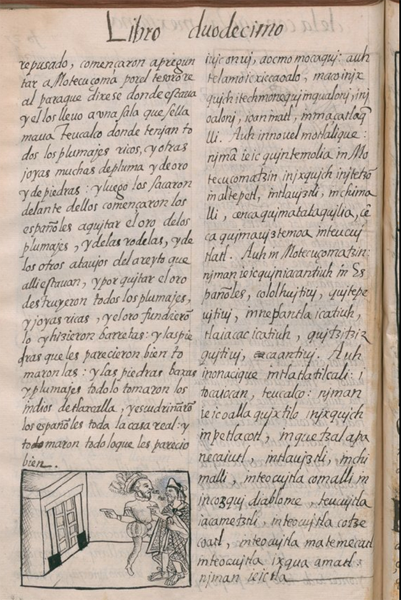 |
[Transcription of the Nahuatl (right-hand column) by James Lockhart:]
[f. 27v.] iuic onui, aocmo mocaqui:auh tel amo ic xiccaoalo, maco in ixquich itech monequiin qualoni, in ioaloni, ioan in atl, in maçatlaq̄lli.
Auh inn o uel motlalique: nimā ie ic quintemolia in Motecuçomatzin in ixquich in itetzō in altepetl, in tlauiztli, in chimalli, cenca quimatataquilia, cēca quimauiztemoa in teucuitlatl. Auh in Motecuçomatzin: niman ie ic quiniacantiuh in Españoles, cololhuitiui, quitepeuitiui, innepantla icatiuh, tlaiacac icatiuh, quitzitzizquitiui,* caantiui. Auh in onacique in tlatlatilcali:** itocaiocan, teucalco: niman ie ic oallaquixtilo in ixquichin petlacotl, in quetzalapanecaiutl, in tlauiztli, in chimalli, in teocuitlacomalli in incozqui diablome, teucuitlaiacametzli, in teocuitlacotzecoatl,*** in teocuitlamatemecatl, in teocuitlaixquaamatl:
niman ie ic tla
----------
*QUITZITZIZQUITIUI. Read "quitzitzitzquitiui." See also fol. 26v.
**TLATLATILCALI. Read "tlatlatilcalli." Nevertheless, the form "cali" for calli is found as a variant in texts of many kinds.
***TEOCUITLACOTZECOATL. Read "teocuitlacotzeoatl."
|
[Translation of the Nahuatl (right-hand column) by James Lockhart:]
went to him; no longer was he heeded. But he was not therefore forsaken; he was given all he needed to eat and drink, and water and deer fodder [for the Spaniards].
And when [the Spaniards] were well settled, right away they interrogated Moteucçoma about all the stored treasure of the altepetl, the devices and shields. They greatly prodded him, they eagerly sought gold as a thing of esteem. And then Moteucçoma went along leading the Spaniards. They gathered about him, bunched about him; he went in their midst, leading the way. They went along taking hold of him, grasping him. And when they reached the storehouse, the place called Teocalco, then all the <shining things> were brought out: the golden disks, the necklaces of the devils, the golden nose crescents, the golden leg bands, the golden arm bands, the golden sheets for the forehead.
Thereupon
[Translation of the Spanish (left-hand column) by James Lockhart:]
they had rested, they began to ask Moteucçoma about the royal treasure so that he would tell them where it was, and he took them to a hall named Teocalco, where they had all the rich feather-pieces and many other jewels of feathers, gold, and fine stones. And then they got them out in their presence.
The Spaniards began to remove the gold from the feather-pieces, shields, and other dancing accoutrements that were there, and in order to remove the gold they destroyed all the feather-pieces and rich jewels. They melted the gold and made it into bars, and they took the stones that seemed good to them. The Indians of Tlaxcala took all the less precious stones and the feathers. The Spaniards scrutinized the entire palace and took everything that seemed good to them.
|
[Translation of the Nahuatl into Spanish by Fr. Bernardino de Sahagún; transcription of the Spanish (left-hand column) by James Lockhart:]
[f. 27v.] repusado, començaron a preguntar a Motecuçoma por el tesoro real para que dixese donde estaua y el los lleuo a vna sala que se llamaua Teucalco donde tenian todos los plumajes ricos, y otras joyas muchas de pluma y de oro y de piedras: y luego los sacaron delante dellos
començaron los españoles a quitar el oro de los plumajes, y de las rodelas, y de los otros atauios del areyto que alli estauan, y por quitar el oro destruyeron todos los plumajes, y joyas ricas, y el oro fundierōlo y hizieron barretas: y las piedras que les parecieron bien tomaronlas: y las piedras baxas y plumajes todo lo tomaron los indios de tlaxcalla, y escudriñarō los españoles toda la casa real: y tomaron todo lo que les parecio bien.
|
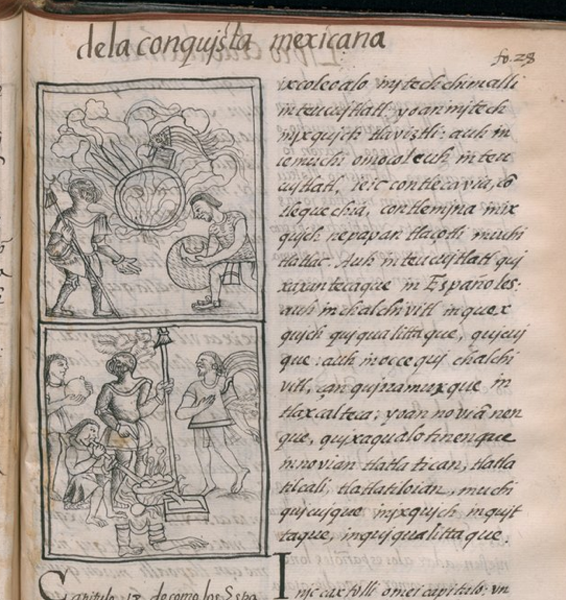 |
[Transcription of the Nahuatl (right-hand column) by James Lockhart:]
[f. 28r.] ixcoleoalo in itech chimalli in teucuitlatl: yoan in itech in ixquich tlaviztli: auh in iemuchi omocoleuh in teucuitlatl, ie ic contlecavia, cōtlequechia, contlemina in ixquich nepapan tlaçotli muchitlatlac. Auh in teucuitlatl quixaxantecaque in Españoles: auh in chalchivitl in quexquich quiqualittaque, quicuique: auh in oc cequi chalchivitl, çan quinamuxque intlaxcalteca: yoan noviā nenque, quixaqualotinenque innovian tlatlatican, tlatlatilcali,* tlatlatiloian, muchi quicuique in ixquich in quittaque, in quiqualittaque.
----------
*TLATLATILCALI. See fol. 27v.
|
[Translation of the Nahuatl (right-hand column) by James Lockhart:]
the gold on the shields and all the devices was taken off. And when all the gold had been detached, right away they set on fire, set fire to, ignited all the different precious things; they all burned. And the Spaniards made the gold into bricks. And they took as much of the greens tone as pleased them; as to the rest of the green stone, the Tlaxcalans just snatched it up. And [the Spaniards] went everywhere, scratching about in the hiding places, storehouses, places of storage all around. They took everything they saw that pleased them. Thereupon they went to the place where Moteucçoma stored his own things, where all his special property was kept, called Totocalco.
[Translation of the Spanish (left-hand column) by James Lockhart:]
(intentionally blank)
|
[Translation of the Nahuatl into Spanish by Fr. Bernardino de Sahagún; transcription of the Spanish (left-hand column) by James Lockhart:]
[f. 28r., la parte de arriba, dos dibujos; sin texto en español]
|
